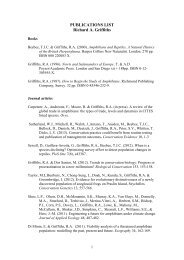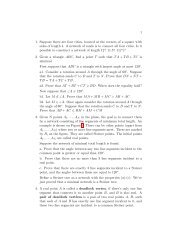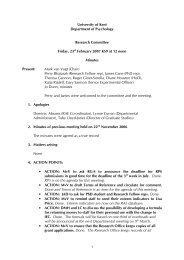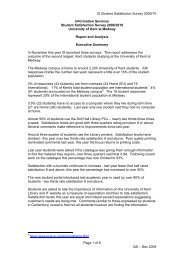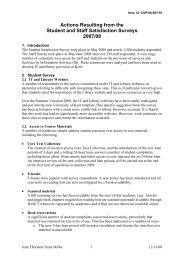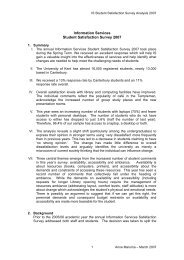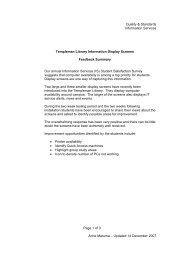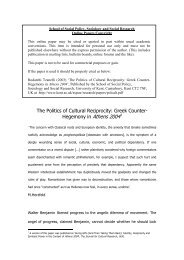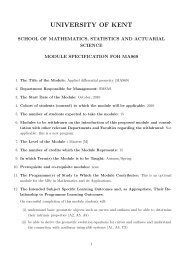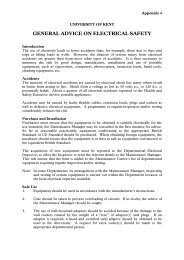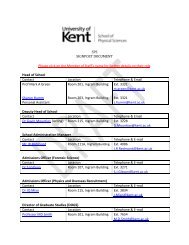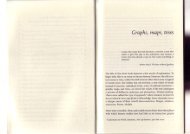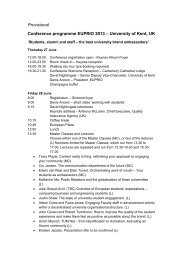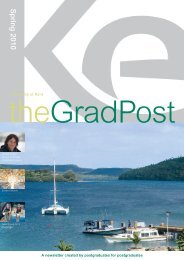The Million Pound Donors Report 2012 - University of Kent
The Million Pound Donors Report 2012 - University of Kent
The Million Pound Donors Report 2012 - University of Kent
Create successful ePaper yourself
Turn your PDF publications into a flip-book with our unique Google optimized e-Paper software.
DONOR CASE STUDY:<br />
BARRIE WELLS<br />
Barrie Wells was born and raised in Liverpool and<br />
created his wealth in financial services. Since selling<br />
his second company, Premierline Direct, in 2006 he<br />
has focused on private investments but dedicates most<br />
<strong>of</strong> his time to running the Wells Sports Foundation<br />
which he founded in 2009.<br />
“My philanthropy began because I’d accumulated a<br />
relatively large sum <strong>of</strong> money from my business activities.<br />
By 2007 it was time to think about my will and how much<br />
to leave my children and that got me thinking about<br />
charity. I decided that I wanted to get the pleasure <strong>of</strong><br />
giving it away to charities <strong>of</strong> my own choice in my own<br />
lifetime rather than leaving it to charities in my will. It<br />
sounds selfish but it was about me wanting to get the<br />
enjoyment out <strong>of</strong> giving it personally away.<br />
I had given money in the past to a school in India and water<br />
projects in Africa but I’d never been out to see them and I<br />
realised I wanted a more direct relationship with the<br />
recipients, to be involved in how it was spent and to see<br />
first-hand the happiness it brings, which I knew would<br />
motivate me to give away more.<br />
<strong>The</strong> idea for my philanthropy came to me whilst I was in<br />
Beijing watching the 2008 Olympics with my son Matthew.<br />
<strong>The</strong> plans evolved to thinking about <strong>2012</strong> coming up in the<br />
UK and how my money could help support elite athletes in<br />
need <strong>of</strong> extra support, whilst at the same time promoting<br />
grassroots sport around the country. So I started giving<br />
away between £400,000 and £500,000 each year.<br />
In 2009 I picked out 20 young athletes who had a chance <strong>of</strong><br />
getting to, and performing well at the <strong>2012</strong> Olympics. But I<br />
didn’t just hand over some cash, they had to come up with a<br />
business plan and explain how my money would help<br />
improve their performance. So for example I helped the<br />
young heptathlete Katarina Johnson-Thompson with travel<br />
because she was just 16 years old and had to get two buses<br />
each way to and from training carrying all the shoes for<br />
seven different events! When she turned 17 I paid for her<br />
driving lessons and helped her buy a car. Other athletes had<br />
different needs: I paid for the 800m runner Jenny Meadows<br />
to do altitude training in Africa, Jessica Ennis needed funds<br />
so that her physiotherapist could travel with her to<br />
competitions and the 400m hurdler Dai Greene wanted<br />
help to move from Swansea to Bath. So the support I gave<br />
was tailored to what they needed to contribute to their<br />
Olympic success. Part <strong>of</strong> the selection criteria was the<br />
chemistry between them and me because I’m not just a<br />
normal sponsor, I want to be part <strong>of</strong> their journey – I want<br />
the MIllIon PoUnd donors rePort <strong>2012</strong><br />
to watch them training, talk to their coaches and become<br />
part <strong>of</strong> their team, so we only come to an arrangement if<br />
they are happy with that.<br />
Before I approached anyone I talked to the sports’<br />
governing bodies to explain what I intended to do and they<br />
wrote a letter explaining that I was legitimate – I didn’t just<br />
turn up at their houses saying: “Hey, your problems are<br />
over!”<br />
I usually paid up to £8,000 a year, but in some cases this<br />
could reach £20,000 when all the support services were<br />
costed in. I will continue funding athletes aiming for the<br />
Olympics in Brazil in 2016, but I can’t extend my support<br />
beyond 20 young people because there isn’t time to<br />
communicate with them in the way I want to.<br />
I knew I wanted to combine support for elite and grassroots<br />
sport but it took some time for that second aspect to<br />
evolve. It was a bit unsophisticated at first, but eventually<br />
we worked out a deal where each athlete I fund gives six<br />
half days to promote the work <strong>of</strong> the foundation by going<br />
into schools. <strong>The</strong>y give a talk to the whole school about the<br />
benefits <strong>of</strong> sport in terms <strong>of</strong> developing self-esteem,<br />
friendships and a positive approach to diet and body image,<br />
and they also do some training in their sport with smaller<br />
groups <strong>of</strong> kids. <strong>The</strong> school kids have to do some research<br />
about the athlete who is visiting them so they are actively<br />
engaged, because I wanted the school to put something in<br />
too and not just have an athlete turn up to do something<br />
passive like hand out prizes. So far we’ve been into 200<br />
schools and talked to 35,000 children. A lot <strong>of</strong> similar<br />
schemes use retired athletes and the big advantage we have<br />
is that the kids can follow the person they’ve met because<br />
they’re still competing. I’ve read that the government is<br />
now thinking <strong>of</strong> doing something similar and asking people<br />
who receive UK Sport funding to go into schools!<br />
<strong>The</strong> next stage is to support sports clubs, because exposing<br />
kids to a sport for one day isn’t enough – if they get<br />
interested in, say, pole vaulting then we want to help<br />
ensure there’s somewhere they can go to take up that sport.<br />
<strong>The</strong> model I’ve set up <strong>of</strong> personal sponsorship for<br />
promising young athletes and swimmers could work in<br />
other areas. It doesn’t need to be athletics – it just needs a<br />
high net-worth person with an absolute passion for any<br />
subject. It could work for any sport and also for things like<br />
ballet and music, say where someone sponsors four<br />
musicians in an orchestra and in return they could go into<br />
schools and try to get the kids interested in classical music.<br />
29



